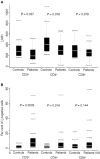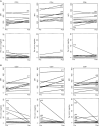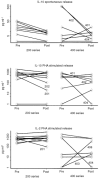Recovery of zeta-chain expression and changes in spontaneous IL-10 production after PSA-based vaccines in patients with prostate cancer
- PMID: 11870501
- PMCID: PMC2375179
- DOI: 10.1038/sj.bjc.6600039
Recovery of zeta-chain expression and changes in spontaneous IL-10 production after PSA-based vaccines in patients with prostate cancer
Abstract
Circulating T lymphocytes of patients with prostate cancer have been reported to have functional deficits, including low or absent zeta-chain expression. To determine whether these functional impairments could be reversed by prostate specific antigen-based vaccination therapy, 10 patients treated with recombinant human prostate specific antigen plus GM-CSF and eight others receiving prostate specific antigen plus oil emulsion in two pilot clinical trials were evaluated prior to and after vaccination for several immunologic end points, including zeta-chain expression and cytokine production by circulating T cells as well as the frequency of T cells able to respond to prostate specific antigen in ELISPOT assays. The flow cytometry assay for zeta-chain expression was standardized to allow for a reliable comparison of pre- vs post-vaccination samples. Prior to therapy, the patients were found to have significantly lower zeta-chain expression in circulating CD3(+) cells and a higher percentage of zeta-chain negative CD3(+) and CD4(+) cells than normal donors. The patients' peripheral blood mononuclear cells spontaneously produced more IL-10 ex vivo than those of normal controls. After vaccination, recovery of zeta-chain expression was observed in 50% of patients in both clinical trials. Also, spontaneous IL-10 secretion by peripheral blood mononuclear cells decreased following immunotherapy in patients treated with prostate specific antigen and GM-CSF. The frequency of prostate specific antigen-reactive T cells was detectable in 7 out of 18 patients vs 4 out of 18 patients prior to vaccination. Only one of 18 patients was a clinical responder. The vaccine had stimulatory effects on the patients' immune system, but post-vaccine immune recovery could not be correlated to progression-free survival in this small cohort of patients with prostate cancer.
Copyright 2002 The Cancer Research Campaign
Figures






Similar articles
-
Generation of PSA-reactive effector cells after vaccination with a PSA-based vaccine in patients with prostate cancer.Prostate. 2000 May 1;43(2):88-100. doi: 10.1002/(sici)1097-0045(20000501)43:2<88::aid-pros3>3.0.co;2-g. Prostate. 2000. PMID: 10754524
-
Safety and immunogenicity of novel 5T4 viral vectored vaccination regimens in early stage prostate cancer: a phase I clinical trial.J Immunother Cancer. 2020 Jun;8(1):e000928. doi: 10.1136/jitc-2020-000928. J Immunother Cancer. 2020. PMID: 32591433 Free PMC article. Clinical Trial.
-
Safety and immunologic response of a viral vaccine to prostate-specific antigen in combination with radiation therapy when metronomic-dose interleukin 2 is used as an adjuvant.Clin Cancer Res. 2008 Aug 15;14(16):5284-91. doi: 10.1158/1078-0432.CCR-07-5162. Clin Cancer Res. 2008. PMID: 18698048 Free PMC article. Clinical Trial.
-
CpG oligonucleotide as an adjuvant for the treatment of prostate cancer.Adv Drug Deliv Rev. 2009 Mar 28;61(3):268-74. doi: 10.1016/j.addr.2008.12.005. Epub 2009 Jan 7. Adv Drug Deliv Rev. 2009. PMID: 19166887 Review.
-
Strategies for the development of PSA-based vaccines for the treatment of advanced prostate cancer.Expert Rev Vaccines. 2003 Aug;2(4):483-93. doi: 10.1586/14760584.2.4.483. Expert Rev Vaccines. 2003. PMID: 14711334 Review.
Cited by
-
Tumor escape mechanisms in prostate cancer.Cancer Immunol Immunother. 2007 Jan;56(1):81-7. doi: 10.1007/s00262-005-0110-x. Epub 2005 Dec 16. Cancer Immunol Immunother. 2007. PMID: 16362411 Free PMC article. Review.
-
Effector CD8+CD45RO-CD27-T cells have signalling defects in patients with squamous cell carcinoma of the head and neck.Br J Cancer. 2003 Jan 27;88(2):223-30. doi: 10.1038/sj.bjc.6600694. Br J Cancer. 2003. PMID: 12610507 Free PMC article.
-
Down-regulation of zeta-chain expression in T cells: a biomarker of prognosis in cancer?Cancer Immunol Immunother. 2004 Oct;53(10):865-78. doi: 10.1007/s00262-004-0521-0. Epub 2004 Apr 29. Cancer Immunol Immunother. 2004. PMID: 15118842 Free PMC article. Review.
-
Correlation between frequencies of blood monocytic myeloid-derived suppressor cells, regulatory T cells and negative prognostic markers in patients with castration-resistant metastatic prostate cancer.Cancer Immunol Immunother. 2014 Nov;63(11):1177-87. doi: 10.1007/s00262-014-1591-2. Epub 2014 Aug 2. Cancer Immunol Immunother. 2014. PMID: 25085000 Free PMC article.
References
-
- AlvingCRShichijoSMattsby-BaltzerIRichardsRLWassefNM1993Preparation and use of liposomes in immunological studiesIn:Liposomes Technology,Gregoriadis G (ed.),pp 317343Boca Raton: CRC Press
-
- BukowskiRMRaymanPUzzoRBloomTSandstromKPeereboomDOlenckiTBuddGTMcLainDElsonPNovickAFinkeJH1998Signal transduction abnormalities in T lymphocytes from patients with advanced renal carcinoma: clinical relevance and effects of cytokine therapy Clin Cancer Res 423372347 - PubMed
-
- CardiGHeaneyJASchnedARPhillipsDMBrandaMTErnstoffMS1997T-cell receptor zeta-chain expression on tumor-infiltrating lymphocytes from renal cell carcinoma Cancer Res 5735173519 - PubMed
Publication types
MeSH terms
Substances
Grants and funding
LinkOut - more resources
Full Text Sources
Medical
Research Materials
Miscellaneous

